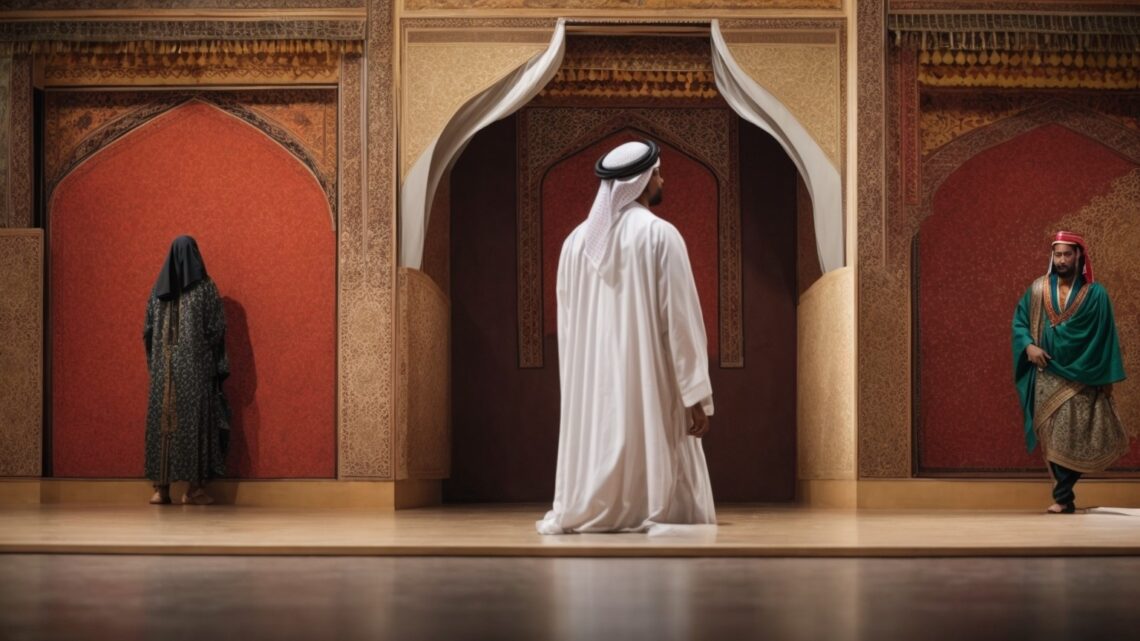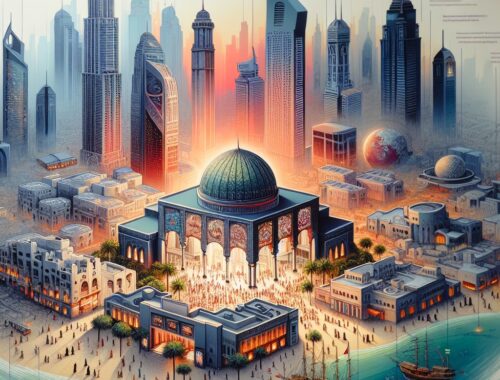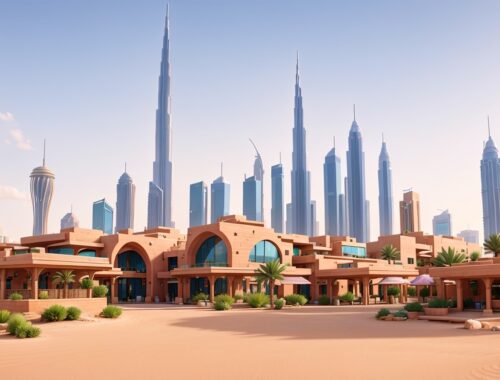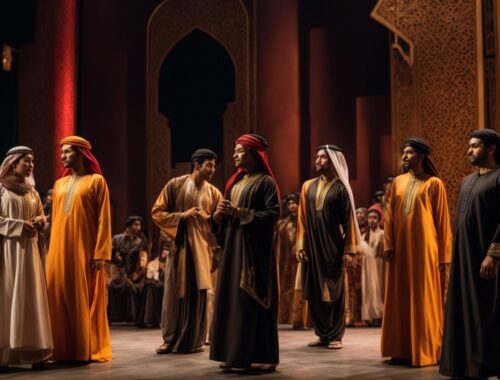
Collaborations Between Dubai and Utah’s Theatre Artists
In an unexpected twist of cultural fusion, the theatrical landscapes of Dubai and Utah have been intertwining in recent years, creating a tapestry of artistic expression that spans continents. This unlikely partnership has given birth to a series of groundbreaking collaborations, pushing the boundaries of traditional theatre and fostering a unique exchange of ideas, techniques, and cultural perspectives.
The Genesis of an Unlikely Alliance
The seeds of this collaboration were sown in 2018 when Emirati director Nayla Al Khaja attended the Sundance Film Festival in Park City, Utah. Impressed by the vibrant arts scene, she reached out to local theatre companies, sparking a dialogue that would soon blossom into a full-fledged partnership.
The first official collaboration took place in 2019, with the joint production of “Desert Mirage,” a play that blended Emirati folklore with Mormon pioneer stories. The production, which premiered at Dubai’s Madinat Theatre, drew an audience of over 5,000 during its two-week run, showcasing the potential of this cross-cultural endeavor.
Cultural Exchange Programs
Building on the success of “Desert Mirage,” both regions established a formal cultural exchange program in 2020. The program, dubbed “ACT” (Art Connects Theatres), facilitates the movement of actors, directors, and technicians between Dubai and Utah.
In its first year, ACT saw 27 Utah-based theatre professionals spending time in Dubai, while 32 Emirati artists traveled to various locations in Utah. These exchanges ranged from two-week workshops to six-month residencies, allowing participants to immerse themselves in the local theatre scene and gain new perspectives on their craft.
Innovative Productions
The collaboration has yielded a series of innovative productions that challenge traditional theatrical norms. One standout example is “Salt and Sand,” a bilingual play performed simultaneously in Arabic and English. The production utilized cutting-edge technology, including real-time translation earpieces for audience members, allowing them to switch between languages at will.
Another notable production was “Digital Dunes,” an interactive online performance that connected actors in Dubai and Utah in real-time. The show, which ran for 30 consecutive nights in 2021, attracted over 50,000 virtual attendees from 62 countries, highlighting the global appeal of this unique partnership.
Training and Education Initiatives
The collaboration extends beyond performances, encompassing training and education initiatives. In 2022, the University of Utah’s Department of Theatre partnered with the Dubai Institute of Design and Innovation to launch a joint MFA program in Transcultural Theatre Studies. The program, which accepts 10 students annually (5 from each country), includes a mandatory semester abroad and culminates in a collaborative thesis production.
Additionally, workshops and masterclasses have become a regular feature of the partnership. Notable events include:
- The “Desert to Mountain” directing workshop, led by Emirati director Omar Ghobash and Utah-based director Anne Bogart, attended by 45 aspiring directors from both regions.
- A puppetry masterclass series conducted by Utah’s Puppet Arts Theatre, introducing Emirati artists to American puppetry techniques.
- A traditional Arabic theatre workshop in Salt Lake City, led by Dubai-based theatre company Layali, introducing Utah artists to the rich traditions of Arabic storytelling.
Technological Innovations
The geographical distance between Dubai and Utah has necessitated innovative technological solutions to facilitate collaboration. This has led to the development of several cutting-edge tools:
- VirtuStage: A virtual reality platform that allows directors and designers to collaborate on set designs in real-time, despite being thousands of miles apart. The platform has been used in over 15 joint productions since its introduction in 2021.
- LinguaSync: A proprietary software developed by a team of Utah and Dubai-based engineers, enabling real-time script translation and subtitling during live performances. The software has been licensed to theatre companies in 17 countries.
- RemoteActor: A low-latency video conferencing system specifically designed for remote rehearsals and performances. The system has been crucial in maintaining collaboration during travel restrictions.
Funding and Support
The collaboration has attracted significant financial support from both public and private sectors. The UAE Ministry of Culture and Youth has allocated an annual budget of AED 15 million (approximately $4.1 million) to support joint productions and exchange programs. In Utah, the Governor’s Office of Economic Development has earmarked $2.5 million annually for the initiative, recognizing its potential for cultural and economic growth.
Private sector support has also been substantial. Dubai-based real estate developer Emaar Properties has committed to building a dedicated theatre for cross-cultural productions, set to open in 2025. In Utah, tech giant Adobe, which has a significant presence in the state, has pledged $1 million annually for five years to support digital innovations in theatre collaborations.
Impact on Local Theatre Scenes
The partnership has had a profound impact on the theatre scenes in both regions. In Dubai, there has been a 35% increase in theatre attendance since the collaboration began, with a notable rise in interest among younger audiences. The number of professional theatre companies in the emirate has grown from 7 in 2018 to 18 in 2023, many of which focus on cross-cultural productions.
In Utah, the collaboration has led to a diversification of theatrical offerings. The state, known for its conservative culture, has seen a 28% increase in productions featuring Middle Eastern themes or characters. This has, in turn, attracted a more diverse audience, with theatre attendance among non-white demographics increasing by 42% since 2019.
Expanding Horizons
The success of the Dubai-Utah theatre collaboration has inspired similar initiatives across the globe. In 2023, a partnership between theatres in Tokyo and Buenos Aires was launched, directly citing the Dubai-Utah model as inspiration. Similarly, a collaborative program between Cape Town and Toronto is in the planning stages, aiming to bridge African and North American theatrical traditions.
The Dubai-Utah partnership itself is also expanding its scope. Plans are underway to include film and television productions, with a joint web series set to begin filming in late 2024. The series, titled “Crossroads,” will feature storylines that alternate between Dubai and Utah, showcasing the landscapes and cultures of both regions.
Conclusion
The collaboration between Dubai and Utah’s theatre artists stands as a testament to the power of art in bridging cultural divides. What began as an unlikely partnership has blossomed into a vibrant, innovative, and mutually beneficial relationship that continues to push the boundaries of theatrical expression.
As this unique alliance enters its sixth year, it serves as an inspiring model for cross-cultural collaboration in the arts. By fostering understanding, encouraging innovation, and creating opportunities for artists and audiences alike, the Dubai-Utah theatre partnership is not just putting on shows – it’s setting the stage for a more connected, creative, and culturally rich global arts scene.
You May Also Like

Dubai’s Thriving Theatre Scene: A Cultural Explosion
August 13, 2024
How Dubai Supports Emerging Playwrights and Artists
August 13, 2024

